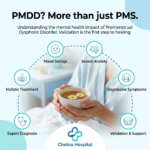Pelvic Inflammatory Disease (PID) is a common but often overlooked infection affecting a woman’s reproductive organs — including the uterus, fallopian tubes, and ovaries. It is usually caused by sexually transmitted bacteria spreading from the vagina to the upper reproductive tract. While PID is treatable, if left unchecked, it can lead to serious long-term health issues such as infertility, chronic pelvic pain, and ectopic pregnancy.
At Chetna Hospital, Sambhajinagar, Chinchwad, our experienced gynaecologists are committed to spreading awareness and providing timely diagnosis and treatment for PID to protect your reproductive health.
🔍 What Causes PID?
PID typically results from a bacterial infection. The most common culprits are sexually transmitted infections (STIs) such as Chlamydia and Gonorrhoea. However, other bacteria can also cause PID, especially after childbirth, miscarriage, abortion, or any pelvic procedure that introduces bacteria into the uterus.
Common risk factors include:
- Having multiple sexual partners
- Unprotected sexual activity
- History of STIs
- Use of intrauterine devices (IUDs) without proper hygiene
- Previous history of PID
🚨 Symptoms to Watch For
One of the reasons PID is dangerous is because it can be silent in its early stages — meaning women may not realize they are infected until complications arise. When symptoms do occur, they may include:
- Lower abdominal or pelvic pain
- Unusual vaginal discharge with a foul odour
- Pain during intercourse
- Fever or chills
- Painful or frequent urination
- Irregular menstrual bleeding
If you experience any of these symptoms, it is crucial to consult a gynaecologist promptly.
🧪 How is PID Diagnosed?
Diagnosis of PID is based on medical history, pelvic examination, and supporting tests such as:
- Vaginal and cervical swabs
- Blood tests
- Pelvic ultrasound
- Laparoscopy (in severe cases)
At Chetna Hospital, we provide complete diagnostic facilities including pathology, ultrasound, and expert consultations — all under one roof.
💊 Treatment & Care
PID is typically treated with antibiotics, often a combination to cover a broad range of bacteria. It is important to:
- Complete the full course of medication
- Treat sexual partners to prevent reinfection
- Abstain from sexual activity until treatment is complete
In severe cases, hospitalization or surgery may be needed, especially if abscesses are present.
💡 Prevention is Better than Cure
The best way to avoid PID is by practicing safe sex and maintaining good vaginal hygiene. Regular gynaecological check-ups, especially after any procedure, can help detect issues early.
Preventive tips include:
- Using condoms consistently
- Getting tested regularly for STIs
- Avoiding douching (which can disrupt natural bacteria)
- Seeking immediate treatment for vaginal infections
👩⚕️ Consult Chetna Hospital Today
Early diagnosis and prompt treatment of PID can protect your reproductive future. At Chetna Hospital, Sambhajinagar, Chinchwad, our skilled gynaecologists offer compassionate, confidential care for all your women’s health needs.
📞 Call us now to book your consultation and take the first step toward better health.
For Consultation Contact us on 9168690447 / 9158681123
Website –
Address – Chetna Hospital, Sambhajinagar, MIDC, G Block, Near Rotary Club, Chinchwad 411019
.
.
.
#hospital#pune#pcmc#chinchwad#health#healthcare#gynaecologist#femalegynaecologist#gynaecologistappointment#gynac#gynaecologistdoctor#gynaecologisthospital#goodgynaecologist#gynaecologistspecialist.












